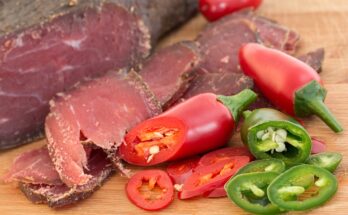Do you ever wonder how your favorite foods burst with irresistible flavors? It’s all thanks to the art of food processing. From fermentation to roasting techniques, seasoning to taste enhancement, food processing plays a vital role in enhancing the flavors we love.
In this article, we will take you on a culinary journey, exploring the fascinating world of food processing and its impact on taste. Through the magic of fermentation, foods transform into tangy and savory delights. Roasting techniques bring out the rich and complex flavors that tantalize your taste buds. Seasoning adds the perfect balance of spices and herbs to elevate any dish. And with the science behind taste enhancement, you’ll uncover the secrets to creating unforgettable flavor combinations.
So, get ready to delve into the captivating world of food processing and discover how it enhances the flavors we savor.
The Art of Fermentation
You can imagine the bubbling jars of fermenting vegetables, releasing their tangy and complex flavors as the microorganisms work their magic. Fermentation is an ancient art that has been used for centuries to enhance the flavors of food. It involves the breakdown of carbohydrates by microorganisms like bacteria and yeast, which produce compounds that give food its unique taste.
Through the process of fermentation, flavors become richer, more intense, and often develop new dimensions. For example, cabbage transforms into sauerkraut, a tangy and slightly sour condiment that adds a punch of flavor to sandwiches and hot dogs. The art of fermentation allows us to explore a vast array of taste sensations, expanding the possibilities of culinary creativity and delighting our palates with the wonders of fermented foods.
Roasting Techniques for Flavorful Delights
Utilizing various roasting techniques can impart a multitude of delightful flavors to culinary creations. Whether you’re a seasoned chef or a home cook, mastering the art of roasting can elevate your dishes to a whole new level.
One popular technique is dry roasting, which involves cooking food in a hot oven without any added liquid. This method allows the natural sugars in the food to caramelize, resulting in a rich and deep flavor profile.
Another technique is open-flame roasting, which adds a smoky element to the dish. This can be achieved by grilling food directly over a fire or using a stovetop grill pan. The smoky flavor adds complexity and depth to meats, vegetables, and even fruits.
Lastly, slow roasting is perfect for tenderizing tough cuts of meat and enhancing their natural flavors. By cooking the meat at a low temperature for an extended period, the collagen breaks down, resulting in a melt-in-your-mouth texture and intense flavor.
So, whether you’re roasting veggies, meats, or even fruits, experimenting with different techniques can unlock a world of delicious flavors for you to enjoy.
The Magic of Seasoning
Seasonings have the magical power to transform ordinary dishes into extraordinary culinary creations. By adding a pinch of salt, a dash of pepper, or a sprinkle of herbs and spices, you can elevate the flavor profile of any dish. The key is to experiment with different combinations and ratios to find the perfect balance. Don’t be afraid to get creative and try new flavors.
Whether it’s a zesty lemon zest, a fragrant garlic powder, or a smoky paprika, each seasoning brings its own unique taste and aroma to the table. Remember, the key to unlocking the magic of seasonings is to use them sparingly at first, and then gradually build up the intensity until you achieve the desired taste.
So go ahead, sprinkle some magic on your next meal and watch it come to life.
The Science Behind Taste Enhancement
Through a fascinating scientific process, our taste buds are able to detect and amplify the flavors present in our meals, creating an explosion of sensory delight in every bite. But have you ever wondered how this taste enhancement actually works?
It all comes down to the science behind it. When food is processed, various techniques are employed to bring out the natural flavors and aromas. For example, the process of fermentation can intensify the taste of certain foods by breaking down complex compounds into simpler ones that are more easily detected by our taste buds. Similarly, the use of enzymes or heat can enhance the flavors by releasing volatile compounds that stimulate our sense of taste.
So, next time you savor a perfectly seasoned dish, remember that it’s not just the ingredients, but the science behind food processing that makes it truly mouthwatering.

Exploring the Culinary World of Food Processing
Get ready to embark on a mouthwatering journey as we dive into the fascinating world of culinary techniques that bring out the irresistible taste and aroma in our favorite dishes. Food processing plays a crucial role in enhancing food flavors, and it involves a variety of methods that transform raw ingredients into delectable creations.
From marinating and brining to smoking and fermenting, these techniques not only add depth and complexity to the taste but also contribute to the overall sensory experience. The culinary world of food processing allows chefs and home cooks alike to experiment with different flavors, textures, and cooking methods, resulting in dishes that are bursting with flavor.
So, whether it’s slow-cooked BBQ ribs or a tangy pickled vegetable salad, food processing techniques can elevate the taste of any dish and leave you craving for more.
Conclusion
So there you have it, food enthusiast! You now understand the significant role that food processing plays in enhancing the flavors of our favorite dishes.
From the art of fermentation to the magic of seasoning, and even the science behind taste enhancement, food processing opens up a world of culinary possibilities.
So the next time you savor a delicious meal, take a moment to appreciate the skill and craftsmanship that went into creating those incredible flavors. Keep exploring and enjoying the wonders of food processing!




